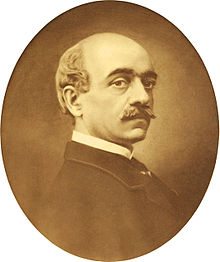Vasile Alecsandri
| Vasile Alecsandri | |
|---|---|
 |
|
| Born | 21 July 1821 Bacău, Moldavia |
| Died | 22 August 1890 (aged 69) Mircești, Romania |
| Occupation | Poet, playwright, politician, and diplomat |
| Signature | |
 |
|
Vasile Alecsandri (Romanian pronunciation: [vaˈsile aleksanˈdri]; 21 July 1821 – 22 August 1890) was a Moldavian poet, playwright, politician, and diplomat. He collected Romanian folk songs and was one of the principal animators of the 19th century movement for Romanian cultural identity and union of Moldavia and Wallachia.
Alecsandri was born in the Moldavian town of Bacău, to a family of landowners. His parents were Vasile Alecsandri and Elena Cozoni, and his mother was the daughter of a Greek Romanian merchant. His parents had seven children, of which three survived: one daughter, Catinca, and two sons, Iancu — a future army colonel – and Vasile.
The family prospered in the lucrative business of salt and cereals trade. In 1828, they purchased a large estate in Mircești, a village near Siret River. The young Vasile spent time there studying with a devout monk from Maramureş, Gherman Vida, and playing with Vasile Porojan, a Gypsy boy who became a dear friend. Both characters would later appear in his work.
Between 1828 and 1834, he studied at the Victor Cuenim 'pensionnat', an elite boarding school for boys in Iaşi. He moved to Paris in 1834, where he dabbled in chemistry, medicine, and law, but soon abandoned all in favor of what he called his "lifelong passion", literature. He penned his first literary essays in 1838 in French, which he had mastered to perfection during his stay in Paris. After a brief return home, he left for Western Europe again, visiting Italy, Spain, and southern France.
...
Wikipedia
